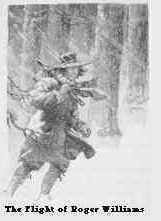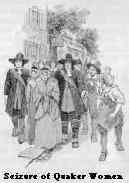NEGenWeb Project
Resource Center OLLibrary
|
74 |
|
[1635 |
|
79. Banishment of Roger Williams
and Mrs. Hutchinson. The fact that the Puritans
considered |
|
1635-1701 ] |
|
75 |
lectured or preached every week, and her influence finally
became so great that a company of soldiers that had been raised to
fight the Indians refused to march because their chaplain did not
agree with Mrs. Hutchinson!
The Legislature decided that Mrs. Hutchinson was
as bad as Roger Williams, "or worse," and compelled her to leave
the colony. Later, the Baptists were forbidden to preach in
Massachusetts and were severely punished when they refused to obey
the command. These were harsh measures, but the colonists believed
that it was their duty to maintain their Puritan faith at any
cost, and they did it.
80. Public Schools; Harvard University, 1636;
First Printing Press (1639); Eliot's Work among the Indians.
The people of the colony were anxious to have their children
educated, and they established the Boston Free Latin School
(1635). It is the oldest public school now existing in any state
originally settled by the English. The Dutch, however, had
established (1633) a church school in New Amsterdam, which still
flourishes. In 1647 the colonists passed a law which practically
provided instruction for every white child in Massachusetts.
England had never done anything like that. That great work laid
the foundation of the common-school system of the United
States.
Meanwhile, the Legislature voted in 1636 to give
£400 -- or what was equal to an entire year's tax of the
colony -- to found a college at Cambridge, near Boston. It is said
that "this was the first legislative assembly in which the people,
through their representatives, ever gave their own money to found
a place of education."
Two years later the Rev. John Harvard of
Charlestown left his library of three hundred and twenty volumes,
and half of his estate -- or about £750, -- to the college.
The Legislature out of gratitude ordered the new institution --
the first English college in America -- to be called by his name:
such was the origin of Harvard University, 1636. Virginia
established William and Mary College, the second in America
(1693), and Connecticut established Yale University, which was the
third (1701).
|
76 |
|
[1643-1750 |
The interest felt in Harvard was so universal
that at one time (1645) every family throughout New England gave
either a peck corn or twelvepence in money towards its support.
The people were poor, but they were determined, as they said,
"that learning should not be buried in the graves of their
fathers."
While the people were doing so much for
education, the Rev. John Eliot of Roxbury, near Boston, was
laboring to convert the Indians. He translated the Bible into the
Indian language and printed it, at Cambridge (1660), on the first
press set up in the American colonies, 1639. When we come to King
Philip's War (§ 86) we shall see how the colonies reaped the
fruit of the labors of the "Apostle to the Indians."
81. The New England Confederation. In
1643 Massachusetts Bay united with Plymouth and with the two
western colonies of Connecticut and New Haven in a Confederation
or league for mutual defense (1643-1684). The chief objects of
this league were :1
1. To protect the colonists against hostile
Indians and against the Dutch of New Netherland (§ 59), who
were trying to get possession of the territory between the Hudson
and the Connecticut rivers.
2. To express the sympathy of the colonists with
the Puritan party in England, which was then engaged in a war
against the tyrannical King Charles I2 (§ 53).
After the Confederation had ceased to exist the
remembrance of it helped the colonists to unite against the French
of Canada, who threatened (1750) to drive them out of the land.
Still later, when trouble with England came, the fact that there
had once been such an organization as the so-called "United
Colonies of New England" prepared the way for that great and
permanent confederation of all the colonies, north and south,
known first as the "United Colonies of America," and finally as
the "United States of America."
1 One object of the
Confederation was to secure the return of runaway slaves to their
masters.
2 The words "you shall bear true
faith and allegiance to our sovereign Lord King Charles" were now
dropped from the oath required by Massachusetts of its governors
and chief officeholders.
|
1656- ] |
|
77 |
|
82. The Coming of the Friends, or
Quakers. Many years after the Puritans |
|
78 |
|
[1643-1750 |
persons of that age such an answer seemed like rejecting both
Church and Bible.
Next, the Quakers differed from other people in
many of their customs. They would not use titles of honor or
respect to any one, and they would not take off their hats to a
magistrate or to the Governor -- no, not even to the King himself.
Furthermore, the Quakers observed no ceremonies in their
worship.
Finally, acting in accordance with what they
believed to be the teachings of the gospel, they refused to do
three things which every citizen then was bound by law to do.
1. They would not give testimony under oath in a
court of justice, or swear to support the government.
2. They would not pay taxes to support any form
of public worship.
3. They would not do military service or bear
arms even in self-defense.1
84. Excesses committed by some Quakers.
But this was not all, for the harsh treatment the Quakers had
received in England and in Boston had driven some of them
well-nigh crazy. In several cases they forced their way into
Puritan meetings on Sunday and cried out that the ministers were
hypocrites and deceivers of the people.
These things occurred only in Massachusetts. The
Quakers in New Jersey and Pennsylvania (§§ 65, 119)
never interfered with any form of worship, and peace and good
order prevailed. In fact, no colony in America prospered more than
that founded by the Quaker, William Penn.
85. The Puritans punish and execute the
Quakers; End of the Persecution. The Puritans were stern men
and they took stern measures. They arrested the disturbers of
their peace, whipped some through the towns, cut off the ears of
others, and drove them out into the wilderness.
All this severity was useless; the Quakers felt
that they had a mission to the Puritans, and they persisted in
returning and
1 The Friends, or
Quakers, believe that they should obey conscience, and, dispensing
with forms, follow literally what they understand to be the
commands of Christ.
|
1656-1675 ] |
|
79 |
preaching it in the loudest manner. They were nonresistants, --
they would not strike back when persecuted; but they would use
their tongues, and their tongues were like two-edged swords. After
repeated warnings, the Massachusetts authorities hanged four of
these missionaries, one a woman, on Boston Common, and buried
their bodies at the foot of the gallows.
Finally, the King ordered the Governor of the
colony to cease punishing the Quakers, and the excitement
gradually died out.
86. King Philip's War. In 1675 Philip,
son of Massasoit (§ 74), and chief of an Indian tribe of
Rhode Island, began a terrible war against the colonists. While
Massasoit lived, the treaty he had made with the English had been
faithfully kept; but "King Philip" believed that if the Indians
did not kill off the white men, then the white men would kill off
the Indians. For this reason the savages made a sudden attack on
the towns of southern and western Massachusetts. They did not dare
attack Boston, but they burned more than half the towns in the
colony.
After about two years of desperate fighting,
Philip's wife, and his only son, a lad of nine, were both
captured. "Now," said the terrible warrior, "my heart breaks. I am
ready to die." Shortly after this Philip was killed at his home at
Mount Hope, not far from Bristol, Rhode Island. His hands were cut
off and carried to Boston, and his head was carried to Plymouth,
where it stood exposed on a pole for twenty years. Many of the
Indian prisoners were sold as slaves in the West Indies. Among
them were King Philip's wife and boy. During the war Eliot's
"praying Indians" (§ 80) saved the lives of many colonists.
With the death of Philip the Indians realized that their power was
broken in southern New England.
 Massachusetts
exclusively their own led to the banishment of Roger
Williams. He had come from England as a minister, and was
settled over the church in Salem. He was one of the very
few men of that day who thoroughly believed in religious
freedom, or, as he called it, "soul liberty." "No one,"
said he, "should be bound to maintain a worship against
his own consent." To say that, was to strike directly at
the law of Massachusetts, which required every man to
attend public worship and to pay for its support.
Massachusetts
exclusively their own led to the banishment of Roger
Williams. He had come from England as a minister, and was
settled over the church in Salem. He was one of the very
few men of that day who thoroughly believed in religious
freedom, or, as he called it, "soul liberty." "No one,"
said he, "should be bound to maintain a worship against
his own consent." To say that, was to strike directly at
the law of Massachusetts, which required every man to
attend public worship and to pay for its support. had
settled Massachusetts the people kept a day of fasting
and prayer on account of news received from England
respecting a strange people called Quakers. It was said
that they were turning the world upside down with their
preaching, and that if they were not stopped, they would
destroy all churches and all modes of government. A
fortnight after that fast day (1656) the inhabitants of
Boston heard to their horror that two women, who were
Quaker missionaries, had actually landed in their
town.
had
settled Massachusetts the people kept a day of fasting
and prayer on account of news received from England
respecting a strange people called Quakers. It was said
that they were turning the world upside down with their
preaching, and that if they were not stopped, they would
destroy all churches and all modes of government. A
fortnight after that fast day (1656) the inhabitants of
Boston heard to their horror that two women, who were
Quaker missionaries, had actually landed in their
town.


